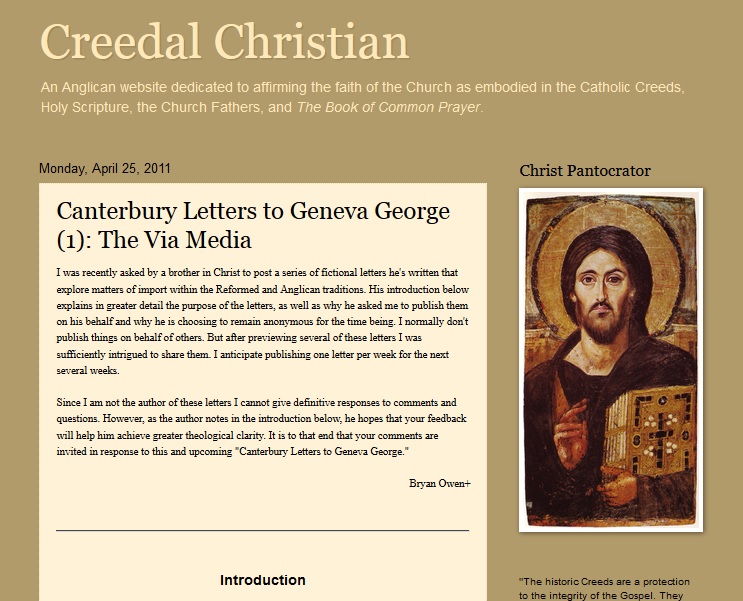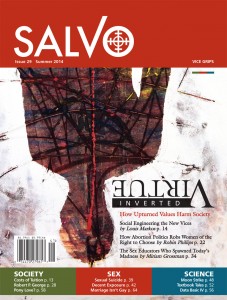 In 2011, an anonymous author published 15 fictional letters at the Creedal Christian blog, exploring a range of practical and theological questions.
In 2011, an anonymous author published 15 fictional letters at the Creedal Christian blog, exploring a range of practical and theological questions.
These letters, which were written from an imaginary Anglican named ‘Canterbury Chris’ to an imaginary Calvinist named ‘Geneva George’, delved into everything from the legitimacy of images in worship to the differences between Calvinist and Anglican ecclesiology.
I can now reveal that I was the author of these letters.
Since many of these letters explicitly criticize some of the sacred cows of Calvinism, I published them anonymously so as not to alienate my reformed constituency or stir up unnecessary division at the Calvinist church I then attended. However, because I have now gone public with my rejection of Calvinism, it seems fitting to claim ownership of these “Canterbury Letters.” They can be read on the Anglican blog where they originally appeared in 2011 or you can download an edited and expanded PDF book version of the same.
Although these letters are fictional, the inspiration for nearly all of them was drawn from actual correspondence I had with Calvinist teachers and friends during my period of questioning reformed theology. It was the inability of the ‘Geneva Georges’ in my life to answer the questions I raised that led me ultimately to abandon Calvinism.
Because these exploratory letters were written during a period of my life when I was in transition, I cannot claim to still hold to all the positions that Canterbury Chris articulates. For example, the statements about catholicity and open communion are an example of positions I would no longer espouse.
“What Others Have Been Saying”
Peter C. Moore, D.D., Associate for Discipleship, St. Michael’s Church, Charleston and author of A Church To Believe In (Latimer) commented
“This is an exciting dialogue between Canterbury Chris and Geneva George exploring the common ground between catholic and reformed aspects of the Faith. While there is still much work to be done to reconcile these polarities, Robin Phillips has made a bold stab and his book is a real page turner. As a life-long Anglican I have much sympathy with the 19th Century Charles Simeon who when pulled between the reformed and catholic wings of the Church said that truth does not lie in some mid-point between two extremes, but at both extremes. For this reason, I guess that would make me a Canterbury George!”
The Very Rev. Dr. Mark A. Quay, President and Dean
Anglican School of Ministry, Little Rock, Arkansas, said this about these letters:
These Letters show an earnest yet good-humored engagement with what many would agree to be the more serious, more thoroughgoing “party” of the Reformation, the Reformed or Calvinist movement. Recalling C.S. Lewis’ Letters to Malcolm, Chiefly on Prayer, these Letters demonstrate respect and even admiration for the Reformed position, personified as Geneva George. Yet the fictional author, Canterbury Chris, does not shrink from charitably noting the shortcomings of the Calvinist George, especially in his tradition’s failure to embrace a more fully orbed, broader vision-ed, dare I say more Catholic understanding of the faith.
The Personal Background to Why I Wrote These Letters
In the ‘New Jerusalem Project Report’ column for Volume 1, Issue 4 of ‘Fermentations’, Brad Littlejohn made an interesting observation. “Like adopted children who one day awaken to seek their birth parents,” he wrote, “young Calvinists have subsequent epiphanies. The first epiphany, of course, is to Calvinism itself with all its promise: a comprehensive and glorious worldview that is finally ready and able to engage the ‘cultural mandate!’”
Littlejohn went on to talk about a second epiphany that many experience, one described by an ancestral longing for the fathers of our faith: “Whereas the first epiphany solidifies youthful vision and brings a sense of satisfaction, the latter comes as an ancestral longing. It leaves a gnawing hunger for fathers in the faith to lead us beyond our Plastic Present.”
Like many evangelicals with a background seeped in fundamentalism, individualism and anti-intellectualism, I found the reformed tradition to be a breath of fresh air. I reveled in the ecclesiology, covenantalism and intellectual rigor that Calvinism provided. Here surely, I thought, was the place where the faith entrusted to all the saints was still faithfully preserved against errors from all sides.
My enthusiasm for the reformed faith led me to try to defend it, specifically against the claims of Rome and Eastern Orthodoxy. I had a personal reason for wanting to do this. You see, as young adults half my siblings converted to Roman Catholicism and the other half to Eastern Orthodoxy. Being the only one left in the Protestant camp, I took it as my personal mission to investigate these other traditions in order to point out their errors and prove them wrong. As I started reading, however, I began to feel the call of the second epiphany.
It wasn’t so much that I began to doubt the doctrines of grace or any specific theological formulations. It was more that I began to ask whether our tradition is big enough to contain the majesty, mystery and expansiveness of the Christian vision as it has been articulated throughout the history of the church and not merely in the last 500 years? Can the profoundly and grandeur articulated by St. Augustine, Dante and George Herbert “fit” within the vision carried and perpetuated by American Presbyterianism? As I began to ask these questions, I was blessed to have many friends, both inside and outside my Presbyterian tradition, who were willing to engage with me in correspondence and conversation over these important matters. Most of the entries in this series have been directly drawn from these discussions, if not sections of actual letters I have written to Calvinist friends, although the events referred to in the letters are purely fictional, as are the characters of Chris and George.
This last point is necessary to emphasize since some scholars who have read these letters were concerned that the character of Geneva George is an unfair caricature of a Calvinist, thus misrepresenting the complexity and diversity of the reformed tradition. While this is a legitimate criticism, I can only say in my own defense that in almost without exception, the views I have attributed to Geneva George are those I have myself encountered in dialogue and correspondence with various Presbyterian friends. But while George’s theology is a composite of those opinions I have encountered in real life, Geneva George himself is not modeled after any individual, living or dead.
[facebook-comments-master-un]Three Ways You Can Support This Blog
Get a copy of my book……..Buy our Essential Oils…………..Subscribe to Salvo




